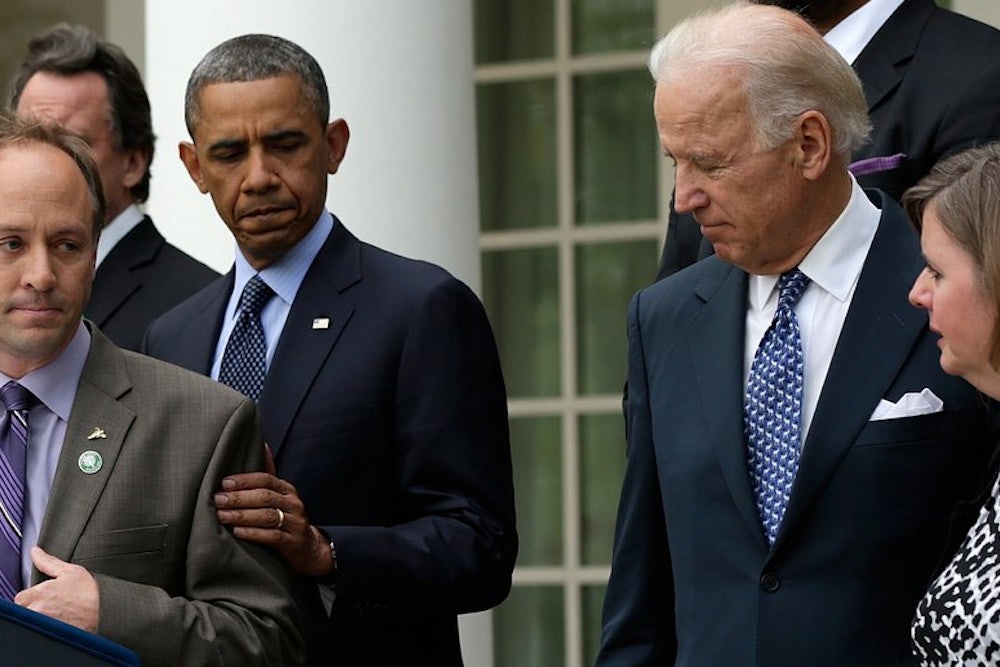For the record, I’m someone who thought gun control, while noble and important, was doomed to fail and therefore a dubious investment of presidential time. Yes, the White House made some tactical mistakes. But there were always massive obstacles to passing a bill. As the president acknowledged Wednesday, the opponents of gun control are “better organized. They're better financed. They’ve been at it longer. And they make sure to stay focused on this one issue during election time.” He might have added that they start any legislative fight with a built-in advantage, since tiny rural states have such outsized influence in the Senate.
Having said that, it’s important not to let the fatalism spin out of control. There’s a subset of liberals who’ve spent the last few years doubting the president’s ability to move Congress on any issue, and the gun control debate only highlighted their despair. But the lesson from gun control is not that determined Republican opposition automatically spells doom for any progressive legislation. The president can overcome it on some issues, not on others. The key, as any Reinhold Niebuhr fan (or John Boehner) could tell you, is to know the difference.
Gun control, unfortunately, is a perfect example of the latter. The reason it's so hard is that guns tend to be remote from the experience of most gun-control supporters. This is true even after a horrific act of gun violence like Newtown. Though every parent was briefly traumatized by the thought of their child being massacred at school, only a small fraction of parents (and especially parents who vote) are directly or even indirectly affected by such crimes.
This means that, even when overwhelming majorities of Americans support a specific gun-control measure, their support is shallow. Guns and gun violence just aren’t something they spend a lot of time contemplating. The voters who oppose gun control, on the other hand, (hunters, shooting enthusiasts, crazy people) devote a good bit of mental energy to firearms. As a result, they’re easily mobilized by the interest groups who spend all their time on the matter (namely gun-makers and lobbyists).1
This same logic extends to other issues. When it comes to climate change, most of us have some vague sense that summers are getting hotter and storms are getting more violent. But, as yet, very few of us have directly felt the consequences of this escalating catastrophe. By comparison, the voters who stand to lose most from carbon regulations—voters who work in the fossil fuel industry or whose states depend on it—have no trouble picturing the downsides of making oil, gas, and electricity costlier. As with guns, the people who spend all their time thinking about this (your friends at Exxon Mobil and BP) can rile them up pretty easily.
That’s the bad news. The good news is that there are a number of issues on which this logic is essentially reversed. For example, when it comes to stimulating the economy, the people who favor government action have no trouble imagining the benefits (more jobs and job security, more after-tax income). It’s the people on the other side who deal in abstractions—too much government debt, some hazy notion of higher interest rates down the road. Pieces of health care reform (like outlawing egregious insurance practices) and financial reform (cracking down on abusive credit card lenders) involved a similar dynamic.
Now, as a practical matter, that didn’t make the recent fights over these issues a walk-over, as anyone who’s opened a newspaper since 2009 could tell you. Those abstract notions—Greece! Big government! Socialism!—can be powerful weapons. But at least the president starts these debates with a kind of forward operating base in public opinion, which can make all the difference. In late 2011, Obama won an extension of the $100 billion payroll tax cut he’d passed the year before, even though the Republican House resisted it. He accomplished this the same way he tried to pass gun control: by traveling the country and accusing the other side of crass obstructionism. Unlike gun control, however, voters got worked up about it because they could easily grasp the benefit of an extra $1,000 in their pockets.
In fact, despite the criticism that Obama has chronically undershot on stimulus (ahem), he’s actually been pretty successful at pressing his economic case when he’s thrown himself into it. It took him a mere three months of harping on the dangers of breaching the debt ceiling to build support for raising it--from 15 percent of Americans to over 50. True, this isn't exactly analogous to passing more stimulus. But, at the very least, it points to the advantage of pitting a concrete argument (don't trigger a job-killing financial crisis) against a distant and theoretical one (we have too much debt). In the fight over background checks, unfortunately, it’s the other side that has this advantage.
Of course, the upshot isn’t that you give up on gun control or regulating carbon. You just give up on the idea of accomplishing these things through presidential persuasion. You can’t, even if you’re as deft a bully-pulpiter as Barack Obama. The only reliable way to make progress is through the year-in, year-out project of organizing volunteers and ginning up voters, and then constantly reminding politicians of the passion you've ginned up. (What the right can do for government debt, the left should be able to do for the gun rights of violent criminals.) In the meantime, I’d prefer that the president stick to fights he has at least an outside chance of winning.
This is related to the old political science truism that legislation is nearly impossible to pass when it produces a tiny benefit for a lot of people, but a big cost for a few powerful interests. But I’m not talking about the interest groups themselves. I’m talking about the voters they’re able to influence.
